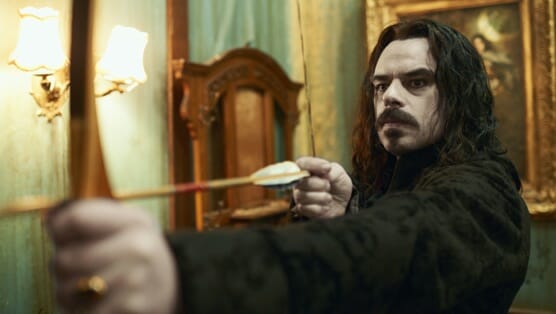What We Do in the Shadows

Who knew that the undead fight over dirty dishes or primp before going out? It’s these types of little moments, paired with almost throwaway bits of dialogue, that turn the vampire mockumentary What We Do In the Shadows into a sublime comedy. As written, directed and starring Jemaine Clement, half of the comedy duo Flight of the Conchords, and Taika Waititi, writer and director of Boy, New Zealand’s highest-grossing film, the film not only tweaks the vampire genre by adding a number of mumblecore elements, but also pays a tongue-in-cheek homage to its history.
The film, which premiered at last year’s Sundance Film Festival, opens with a series of title cards that credit the New Zealand Documentary Board and also explain the film’s premise: A documentary crew was given full access to follow a secret society based in Wellington, New Zealand during the months leading up to the Unholy Masquerade Ball, the social event of the year. The intertitles also note that the crew was assured protection from their subjects, and issued crucifixes, just in case.
Just as this semi-serious atmosphere’s set, it’s pierced by the horrifying sound—to the living and undead alike—of a buzzing alarm clock. Viago (Waititi), a congenial 379-year-old vampire, alights from his coffin and cautiously checks the windows to make sure it’s 6 p.m. (and not a.m.). He gives the camera crew a tour of the house and introduces his flatmates. The dandy vampire rooms with three others: Vladislav (Clement), an 862-year-old medieval vampire with a perverted past; the “young,” rebellious 183-year-old Deacon (Jonathan Brugh); and the 8,000-year-old Petyr (Ben Fransham), who’s a dead ringer for Count Orlok in Nosferatu.
The cameras first document a flatmate meeting in which Viago and Vlad confront Deacon for not washing his dirty, bloody dishes in the sink—for five years. Viago points to the chore wheel on the wall that hasn’t moved, and they order Deacon to start pulling his weight around the house. “Vampires don’t do dishes,” Deacon exclaims as he and Viago literally fly into a vampire-roommate showdown. Many other moments capture the mundane and the minutiae of the vampires’ lives, from the need to sketch each other before they leave home because they can’t see their own reflections in mirrors to the problems associated with clubbing in Wellington, especially when vampires need to be invited in before entering an establishment.
Their world becomes a little more complicated when Petyr turns “dinner” guest Nick (Cori Gonzalez-Macuer) into a vampire. The slacker’s brashness rubs the other vampires the wrong way. Nick indiscreetly practices flying, he tells girls in the bars that he’s the main guy in Twilight and, worst of all, he sees nothing wrong with disclosing that he’s a vampire. On the flip side, Nick and his human buddy Stu (Stu Rutherford) help Viago, Deacon and Vlad into the 21st century. Rutherford, an actual computer analyst-turned-actor, emerges as the film’s low-key star. Stu helps set up TVs and computers in the house and introduces the roommates to Skype and Google, where they immediately search for videos of the sunrise and pictures of virgins. It turns out that men will be boys, even when they’re centuries-old vampires.
-

-

-

-

-

-

-

-

-

-

-

-

-

-

-

-

-

-

-

-

-

-

-

-

-

-

-

-

-

-

-

-

-

-

-

-

-

-

-

-








































